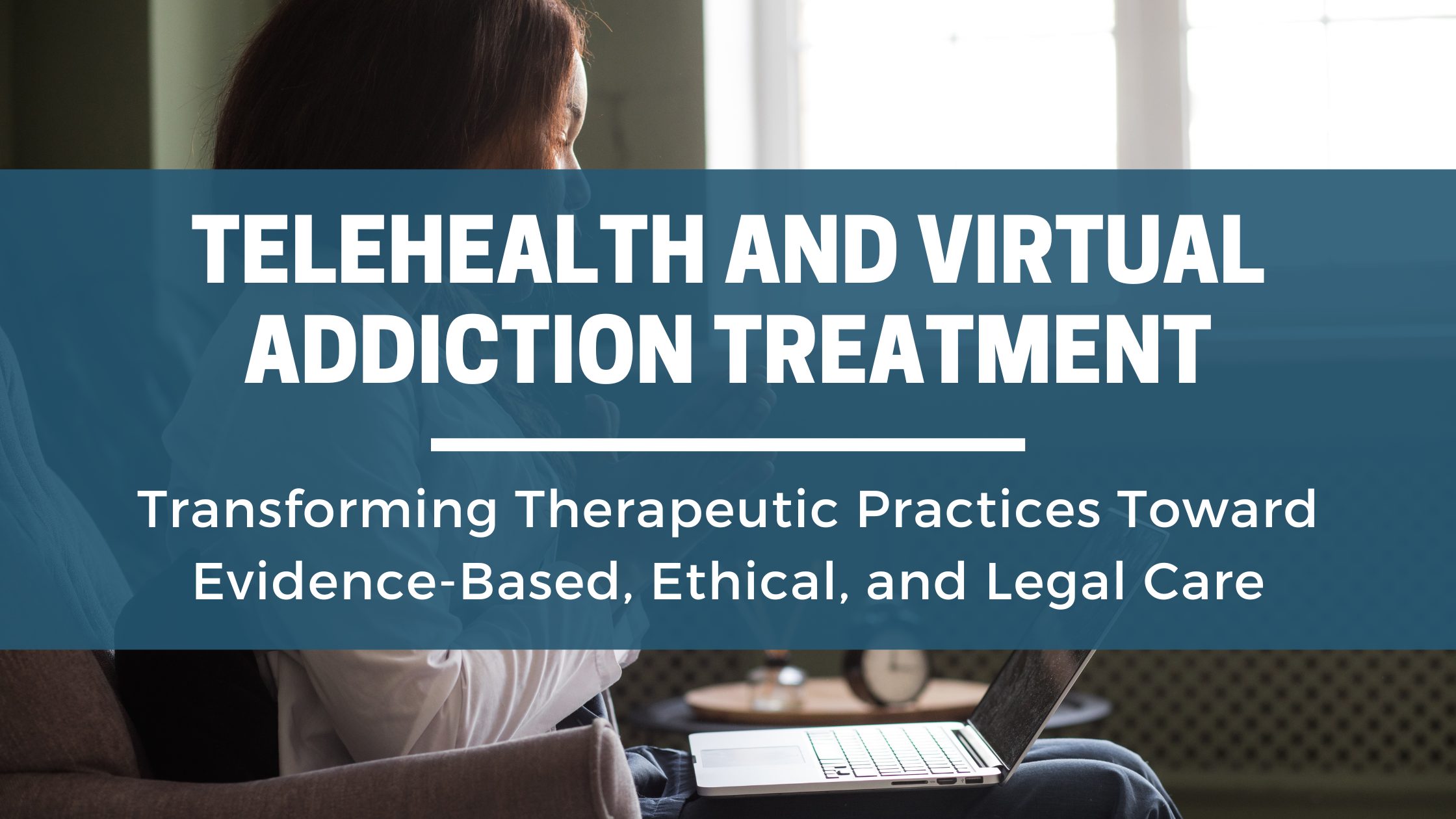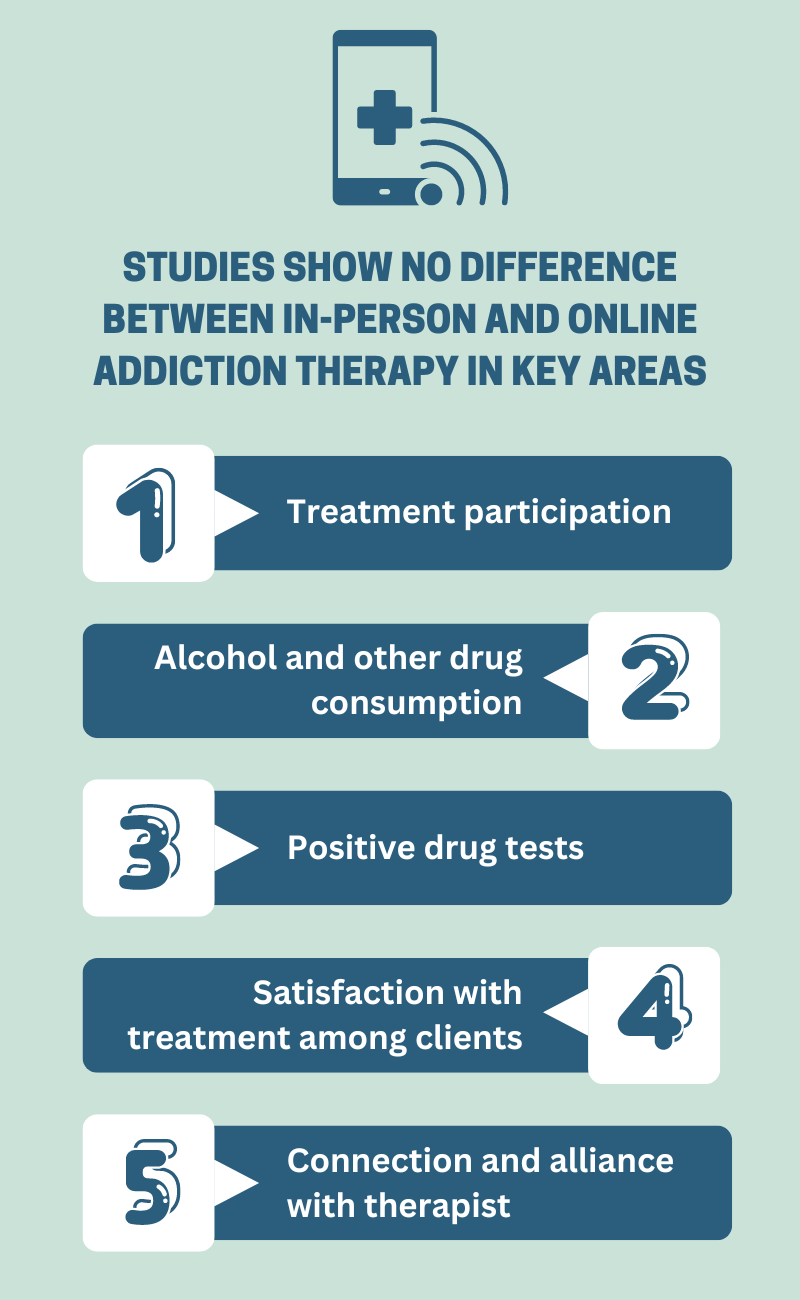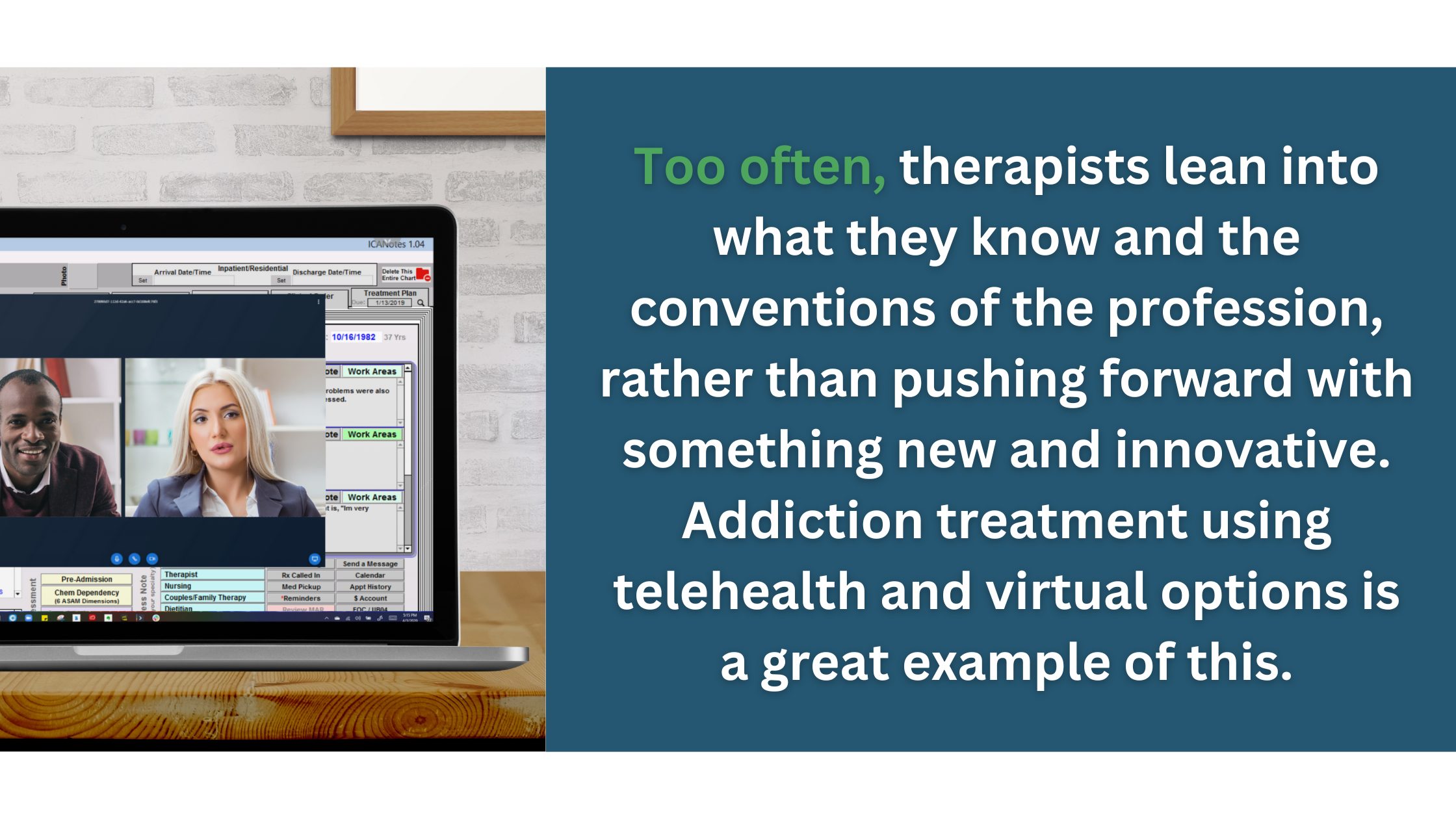
Telehealth and Virtual Addiction Treatment: Transforming Therapeutic Practices Toward Evidence-Based, Ethical, and Legal Care
The world of online and virtual therapy has been growing and expanding since the 1990s, but the 2020 COVID-19 pandemic accelerated adoption at inconceivable rates. With such a shift towards telehealth for mental health and substance use treatment, therapists want the answers to many questions regarding the process, the outcomes, and the risks of delivering substance use care to clients remotely.
Keep reading to explore questions that counselors, social workers, and psychologists have regarding the use of virtual addiction treatment for their clients and ways to make it safer and more effective.
Download our Free Guide on Going Virtual
This comprehensive guide covers everything from setting up telehealth services to navigating legal and insurance considerations, helping you streamline your practice and provide high-quality care remotely. You’ll gain practical tips on increasing client access, reducing cancellations, and boosting your practice's efficiency—all while ensuring compliance and security. Don't miss out on this essential resource to enhance your telehealth services!

Common Questions of Therapists Using Telehealth Addiction Treatment
Therapists should have one primary concern when it comes to their clients and their profession - Is this treatment going to help my client? Though this question is paramount, especially with something as serious as substance use disorders, there are other questions frequently posed.
Practitioners question issues like:
- Is this treatment safe?
- Is this treatment effective?
- Is this treatment best practice for this disorder or collection of symptoms?
- Am I offering this treatment because it is convenient for me or best for my client?
- What methods am I using to collect data?
- How will I consult with other professionals about this case?
- How will I get paid for my services? How much will my clients owe?
- What kind of virtual services will I offer?
At the beginning of the process, there are so many questions regarding the path forward that the therapist may abandon the entire process or feel like they are suffering from decision fatigue. The good news is that many of the most significant questions have clear answers.
Is Online Addiction Treatment Effective?
For nearly 10 years, experts have known that online, remote, and virtual treatments for a variety of mental health concerns have been effective. Not only are these services effective, but they are usually as effective as in person individual and group therapy.
Studies discover that between in-person and online addiction therapy, there are no differences in:
- Treatment participation
- Alcohol and other drug consumption
- Positive drug tests
- Satisfaction with treatment among clients
- Connection and alliance with therapist
Addiction treatment is a service that acknowledges the cycle of relapse and recovery, but with online addiction treatments, the client has at least an equal opportunity for recovery compared to in person treatment groups.

Does Insurance Pay for Telehealth Addiction Treatment?
At this point, all major insurance groups pay for telehealth services, and in many cases, the virtual services are indistinguishable from in-person therapies in terms of reimbursement rates, session number, or copays and other out-of-pocket expenses.
As the therapist, it becomes your mission to dive into the available information about each insurance you are credentialed with to determine:
- What different standards are in place?
- If yearly in person meetings are required?
- If you must be within a specified distance from your client?
- If you can see the client while they are on vacation in another state?
- If you need specific language in the documentation to illustrate your client’s consent to services?
Insurance accepts telehealth for mental health services, but they may use specific criteria that therapists must jump through in order to get paid and hold on to those funds. It will serve you well to become familiar with the fine print of those insurance plans.
Which Type of Virtual Treatment is Best for Substance Use Disorders?
Selecting a type of virtual addiction treatment is very similar to choosing a theoretical orientation for the specific client. In the end, the best treatment depends on a number of individual factors.
Most would agree that a platform that allows for synchronous audio/ video messaging is going to be the superior option in most situations. This method creates a situation that most accurately mimics a live, face-to-face session.
Some clients, though, are going to thrive with audio-only sessions, while others are going to do really well with self-guided online modules that require little of the therapist’s time.
The most important consideration here is to keep an open mind and avoid assumptions. Just because other telehealth options worked for someone in the past does not mean it will work well for the future.

Considering Varied Treatment Options
Too often, therapists lean into what they know and the conventions of the profession, rather than pushing forward with something new and innovative. Addiction treatment using telehealth and virtual options is a great example of this.
Therapists may be too keen on replicating in-person therapy sessions online, while completely novel options are available. For example, instead of doing mostly one-on-one virtual sessions, a therapist could exclusively use group therapist options.
Instead of completing synchronous therapy, a therapist could create an online treatment protocol that leverages asynchronous communication, information, and education. This method may involve more effort at the outset, but it could lead to the ability to treat people efficiently in a short amount of time. Other therapists will use virtual reality training to bring about change.
Here, you would have to actively solicit feedback from the clients that use this method to ensure the offering is helpful. The goal of innovation must be to help as many people as possible. It cannot be a matter of making more money or doing less work, but these could be positive side effects of your efforts.
The Benefits of Connecting to Others
As a therapist working with addiction and other mental health concerns, one thing you don’t want to do is work in isolation. You will become a better, more effective, and more ethical therapist by building a network of connected therapists.
Connecting to other therapists could look different for each provider. Some may prefer weekly, formal meetings to get together and discuss potential issues and changes to the world of telehealth treatment. Others may opt for a social media group that shares news and information as it develops.
No matter which format you choose, these groups are helpful because they keep you connected to any changes in the laws, regulations, and guidelines directing the care. Without these links, you could go for a period of time in violation of some legal or ethical standard without even being aware.
Final Thoughts on Virtual Addiction Treatment
Using telehealth for online addiction treatment is a great plan that offers convenience, flexibility, and effective care from the person’s home. Good therapists consider ethical and effective treatment options, while great therapists use technology to break away from conventional treatment options and explore new frontiers of what addiction treatment can be. For mental health innovators, it’s an exciting opportunity.
No matter your plan, ICANotes can be by your side offering documentation options that allow you to track the amazing work you do. ICANotes offers a comprehensive EHR solution that can greatly benefit clinicians delivering virtual addiction treatment services. Here's how:
- Efficient Documentation: ICANotes simplifies the process of documenting therapy sessions, assessments, and progress notes with intuitive, pre-configured templates designed for mental health and addiction treatment. This allows clinicians to spend less time on paperwork and more time with clients.
- Telehealth Integration: With built-in telehealth features, ICANotes supports virtual sessions directly through the platform, making it easier to connect with clients remotely. This seamless integration ensures clinicians can deliver care without juggling multiple systems.
- Compliance and Billing Support: ICANotes helps clinicians stay compliant with telehealth regulations by offering tools to ensure proper documentation and billing for online addiction treatment. It also supports billing for insurance reimbursement, streamlining claims submissions for virtual sessions.
- Outcome Tracking: ICANotes allows clinicians to track patient progress with customizable assessments and data-driven insights. This helps monitor treatment effectiveness and adjust care plans accordingly.
- Secure Communication: The platform ensures that all communications between clinicians and clients are HIPAA-compliant, offering secure messaging and video conferencing to protect sensitive patient information.
By leveraging ICANotes, clinicians can enhance the delivery of virtual addiction treatment, improving efficiency, compliance, and client outcomes. Try it out free today!
Start Free Trial
About the Author

Eric Patterson, MSCP, NCC, LPC
Eric Patterson, MSCP, NCC, LPC, is a professional counselor who has been working for over a decade to help children, adolescents, and adults in western Pennsylvania reach their goals and improve their well-being.
Along the way, Eric worked as a collaborating investigator for the field trials of the DSM-5 and completed an agreement to provide mental health treatment to underserved communities with the National Health Service Corp.
Sources
Indiana University. (2022). IU Researcher Creates Virtual Reality Experiences to Aid Substance Use Disorder Recovery.
Mark, T.L. et al. (2021). Addiction Treatment and Telehealth: Review of Efficacy and Provider Insights During the COVID-19 Pandemic, Psychiatric Services.
U.S. Department of Health and Human Services. (2023). Telehealth for Behavioral Health Care.

